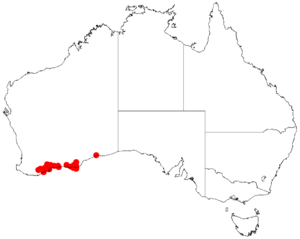Acacia nitidula facts for kids
Quick facts for kids Acacia nitidula |
|
|---|---|
| Conservation status | |
| Scientific classification | |
| Genus: |
Acacia
|
| Species: |
nitidula
|
 |
|
| Occurrence data from AVH | |
Acacia nitidula is a type of shrub that belongs to the large Acacia family. It is a special plant because it grows naturally only in a specific part of southwestern Australia. This means it is endemic to that area.
About the Acacia nitidula Plant
This spreading shrub usually grows to be about 0.6 to 2 metres (2 to 7 ft) tall. Its branches are slightly angled and can be smooth or have a few hairs. It has small, thin stipules, which are like tiny leaf-like parts at the base of the leaf stalk. These stipules are about 1 to 1.5 mm (0.039 to 0.059 in) long and fall off easily.
Like most Acacia plants, Acacia nitidula has phyllodes instead of true leaves. Phyllodes are flattened leaf stalks that act like leaves. These phyllodes are smooth and stay green all year. They are shaped like a narrow spearhead, either straight or slightly curved. Each phyllode is about 1.5 to 3 cm (0.59 to 1.18 in) long and 2 to 5 mm (0.079 to 0.197 in) wide. They have two main veins on each side. When it flowers, this plant produces bright yellow blooms.
Naming and Classifying Acacia nitidula
The scientific naming and classification of plants is called Taxonomy. Acacia nitidula was first officially described by a botanist named George Bentham in 1864. He included it in his important work called Flora Australiensis.
Later, in 2003, another botanist named Leslie Pedley reclassified it. He moved it to a different genus, calling it Racosperma nitidulum. However, in 2006, it was moved back to the Acacia genus, where it remains today.
Where Acacia nitidula Grows
This plant is native to several regions in Western Australia. You can find it in the Wheatbelt, Great Southern, and Goldfields-Esperance areas.
It often grows among large granite rocks. It prefers to grow in sandy or gravelly soils that come from granite. The plant's natural home stretches from Jerramungup and Ravensthorpe in the west. It reaches as far east as Cape Arid National Park, including Middle Island.


